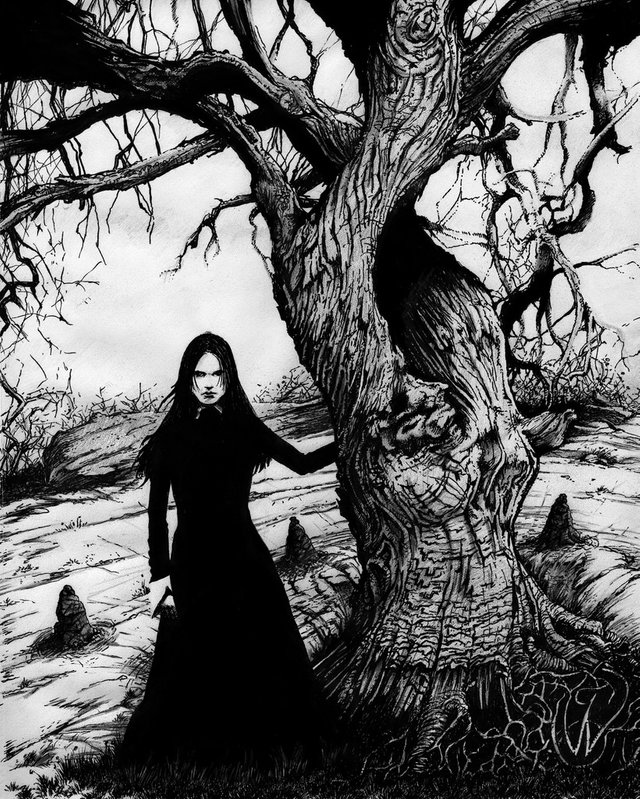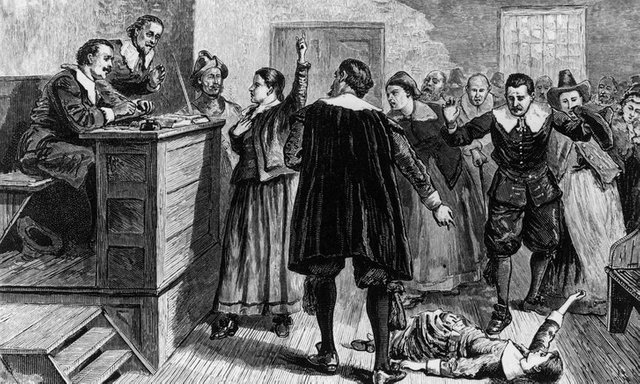The Witch Of Osyth

In 1582, an English woman named Ursula Kemp was convicted of using witchcraft to kill and bring harm to her neighbors. Her ultimate fate: death by hanging. The woman is now known as The Witch of Osyth.
But, who exactly was Ursula and what brought about her charges?
Early life, career and accusation
Ursula Kemp was born in St Osyth, Essex in 1525. She made a living by creating and selling herbal potions to the local townsfolk. Ursula also took on the role of midwife and attended births along with wet nursing infants.
One day Ursula visited the home of Grace Thurlow, a pregnant neighbor, but learned she had already accepted the services of another midwife. Ursula was outraged by the revelation and spewed crude insults that others within earshot later perceived as a curse. Shortly thereafter, Grace gave birth to a baby girl named Joan who experienced a tragic mishap; she fell from her cradle and died as a result of a broken neck.
At the time, Grace did not connect the death of Joan to her previous encounter with Ursula. Possibly due to grief, Grace’s health began to deteriorate and she eventually became crippled. Out of desperation, she contacted Ursula and asked her for a cure. Ursula agreed, but demanded 12 pence to be paid after treatment.
Grace started to feel better but later admitted to Ursula that she was too poor to pay her for the aid. This infuriated Ursula, as she obviously depended on the income to live. Another argument ensued and this time Ursula swore she would get even with Grace.
Author Emma Wilby (Cunning Folk and Familiar Spirits) wrote about the series of events that occurred after the altercation:
“Grace, who became lame again, testified that since the quarrel, both she and her son had suffered. She blamed Ursula for her son’s illness, her own lameness, and the death of her baby. Grace complained to the magistrate and an investigation had begun.”
The Witch of Osyth trial, execution and later discovery

Depiction of a witch trial in the 1600s. Credit
On March 29th, 1582, Ursula Kemp was tried at Chelmsford Court for witchcraft. During the trial, neighbor Alice Letherdale reported that Ursula had once asked to borrow an abrasive cleaner known as scouring sand, but turned her down and called her a “naughty beast” due to the woman’s reputation. Witchcraft in England author Barbara Rosen explained what happened next:
“Alice’s daughter Elizabeth later saw Ursula, who ‘murmured’ at her. When Elizabeth fell ill and died, Alice blamed Ursula for bewitching the girl to death.”
Ursula’s son Thomas took the stand and testified that she housed four familiars (spirits): a black cat named Jacke, a black toad named Pygine, a white lamb named Tyttey and a grey cat named Tyffin. Rosen reports:
“He said that he had seen his mother supply her familiars with beer and cake, and let them suck blood from her body.”
Thomas also revealed he had witnessed Ursula give an earthenware pot to a woman named Alice Newman and believed it contained at least one of the familiars. The woman later returned and accused Ursula of cursing the pot, resulting in a local couple’s death.
Ursula allegedly made a private confession to Justice Brian Darcy. She stated that ten years earlier, she had become partially lame and visited a local folk healer who told her someone with ill-intent cast a spell on her. The healer explained the only way for Ursula to return to normal was to perform a ritual with a variety of ingredients, including sage and pig’s dung. Ursula carried out the ritual as instructed and, to her astonishment, was completely cured.
She said she had used the exact same method to help others in town that were afflicted with lameness. Justice Darcy also mentioned that Ursula admitted to possessing the four familiars Thomas previously spoke of:
“She said there were two male spirits, that killed people, and two female spirits, that brought sickness to people and destroyed cattle. Ursula went on to confess to sending her familiars to make Grace Thurlow lame and to kill Joan Thurlow, Elizabeth Letherdale and Ursula’s sister-in-law.” (Source: Witchcraft in England)
Twelve other women were tried as a result of her confession. Six were killed by hanging, including Ursula. It is unknown what happened to the others.
According to website ursulakemp.co.uk:
“…It wasn’t unusual for women accused of witchcraft to be hanged in their village and then buried in local unconsecrated ground.”
“In 1921 two skeletons were discovered in a garden by Mr. Charles Brooker, a tenant in St Osyth carrying out some building work. One skeleton was badly damaged. The bodies were clearly not near a burial ground and Mr. Brooker having some knowledge of the history of witches in the village decided to cash in by arranging visits from local people wanting to see the ‘witches’ skeleton. Only the house burning down in an unexplained fire in 1932 halted the interest in what was now believed to be the body of Ursula Kemp and the remains were reburied at the site.”
Ursula’s skeleton was exhumed 30 years later and her bones were reportedly sold to Cecil Williamson, founder of The Museum of Witchcraft and Magic in Boscastle, for safekeeping. The remains were later transferred to Robert Lenkiewicz, an eccentric artist who was known to have a fascination with witchcraft and the occult.
“[Robert’s] life was rather complex and when he died heavily in debt the skeleton of Ursula became tied up in the wrangles of his estate.”
“In cooperation with St Osyth Parish Council, a plot with a north-south orientation was located in unconsecrated land and on April 15th with both Pagan and Christian representatives present, the skeleton of ‘Ursula’ was finally laid to rest as a poignant and symbolic gesture for her and her fellow accused.” (Source: Ursula Kemp, the witch who wouldn’t stay buried)
Main image credit: Flickr
Hi @latenighthour, I just stopped back to let you know your post was one of my favourite reads and I included it in my Steemit Ramble. You can read what I wrote about your post here.
Join us on Thursdays for Pimp Your Post Thursday at 11am EDT or 7PM EDT in the Steemit Ramble Discord or:
If you’d like to nominate someone’s post just visit the Steemit Ramble Discord. If I use the post, you earn a portion of the rewards.
Pimp Your Post Thursday is a live curation show where you get to know others and they you. You can promote your post or someone you think needs more notice.
Wow, that was interesting. The horrors of the past. Hard to understand so many people, and especially women, were murdered because of such irrational beliefs. Thanks for a good article.
This post was shared in the Curation Collective Discord community for curators, and upvoted and resteemed by the @c-squared community account after manual review.
Get a free Bible for your phone, tablet, and computer. bible.com